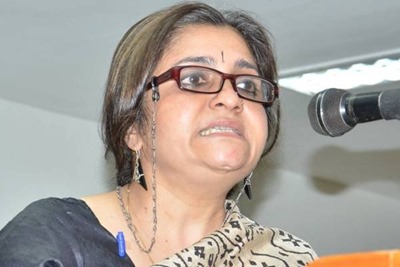
Angry exchanges between senior advocate Kapil Sibal, representing the social activist Teesta Setalvad and her husband, Javed Anand, and the Solicitor General, Ranjit Kumar, marked the hearing before Court No 3 at 2pm before justices Anil R Dave, Fakkir Mohammed Ibrahim Kalifulla and V Gopala Gowda.
The hearing started with both Kapil Sibal and the counsel for the Gujarat Government, Mahesh Jethmalani, making their brief submissions.
Senior advocate, Dushyant Dave intervened.
When the bench was keen to extend protection from arrest for the couple only up to a certain date, without mentioning when the three-judge bench was likely to begin hearing their appeal against denial of anticipatory bail by the Gujarat High Court on merits, both Sibal and Dushyant Dave protested.
Dushyant Dave asked whether a citizen should suffer if the registry listed it wrongly before a two-Judge bench earlier knowing full-well that it should be heard by three judges - a mistake that Justice Dave had earlier expressed his frustrations over.
Therefore, he said, protection from arrest must continue till the time the three judge bench begins to hear the arguments on merits, and settles the matter. Raising his voice, he said he was only expressing his frustration with the system.
Mahesh Jethmalani, on the contrary, alleged that there was undue indulgence towards the accused by the court.
When the AOR Aparna Bhat pointed out that the practice of the registry is to list the IAs before a two Judge bench, even if the main matter is to be heard by three Judges, the bench seemed to be unaware of any such guideline or practice.
The SG, Ranjit Kumar, told the bench, that the accused were not cooperating with the investigations, and whenever they came to the CBI’s office, they came in a procession.
This was vehemently denied by Sibal. Ranjit Kumar then submitted photographs or news clippings to buttress his allegation. Sibal then said they might have come in a procession upto the CBI office, but would have entered the office alone along with their chartered accountant.
Dushyant Dave asked why 200 CBI personnel visited her home during the raid. Why not 2000, he wondered.
The SG then tried to argue the case under Foreign Contribution Regulation Act (FCRA) separately in which the Teesta couple’s company, Sabrang Communication and Publishing Pvt Ltd, had received Rs 1.8 crore from US-based Ford Foundation, allegedly without mandatory approval from the Centre.
In this case, the Bombay high court had granted anticipatory bail to them on certain conditions. When the SG referred to this allegation, Sibal said the FF grant was not a donation, but fee for certain services, and TDS was deducted by the FF
The Bombay high court, while granting anticipatory bail to the couple in this matter, had said that there was some misuse of amount they received from the Foundation for which the applicants-accused were undoubtedly answerable.
The court had granted anticipatory bail because it could not accept the Government’s claim that the couple constituted any threat to sovereignty and integrity of India or threat to the security strategic or economic interest of the State or public interest.
The high court was clear that in a democratic state, a citizen has right to have different ideology, belief and different point of view and it is a duty of the State to protect the said right to have freedom of expression to the same.
Today, the SG selectively read from the high court’s order. Among the conditions the high court imposed on the couple was the one which said that they should cooperate with the investigating agency and report to their office at Mumbai as and when called. The bench warned that if this condition is violated, then the anticipatory bail could be cancelled.
The bench then agreed to hear both the matters together, and adjourned them to 1 December, while extending protection from arrest to 5 December.
threads most popular
thread most upvoted
comment newest
first oldest
first
threads most popular
thread most upvoted
comment newest
first oldest
first